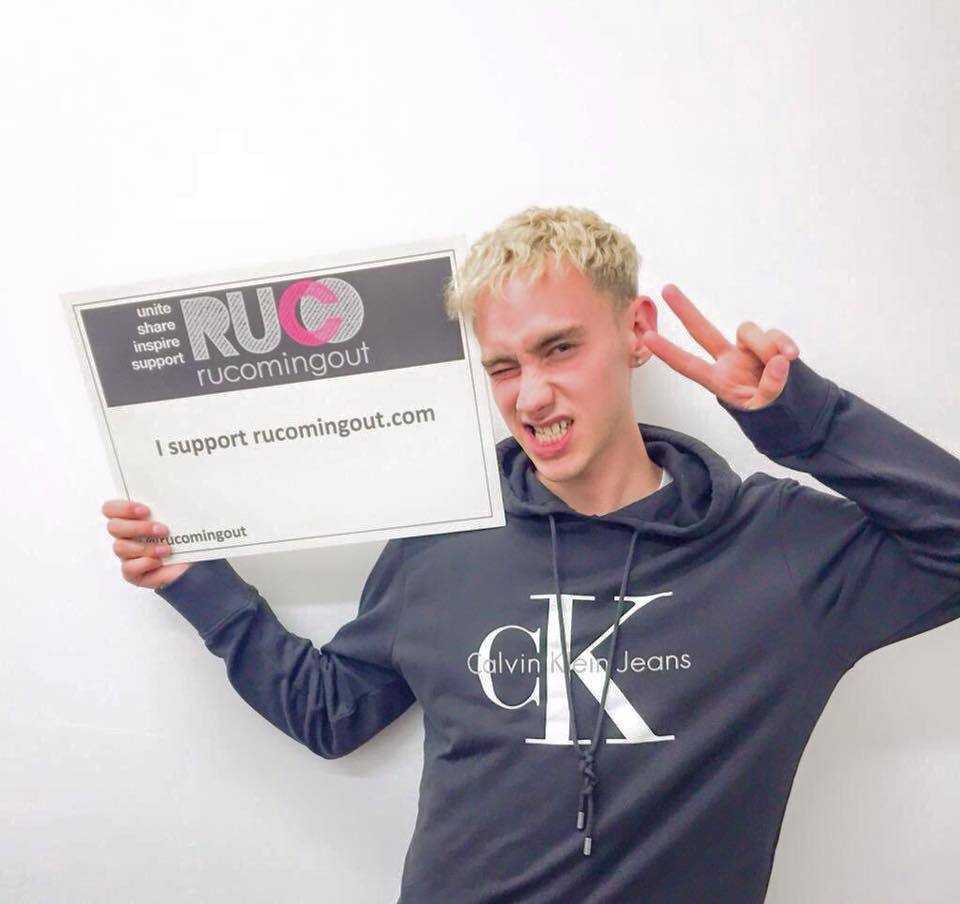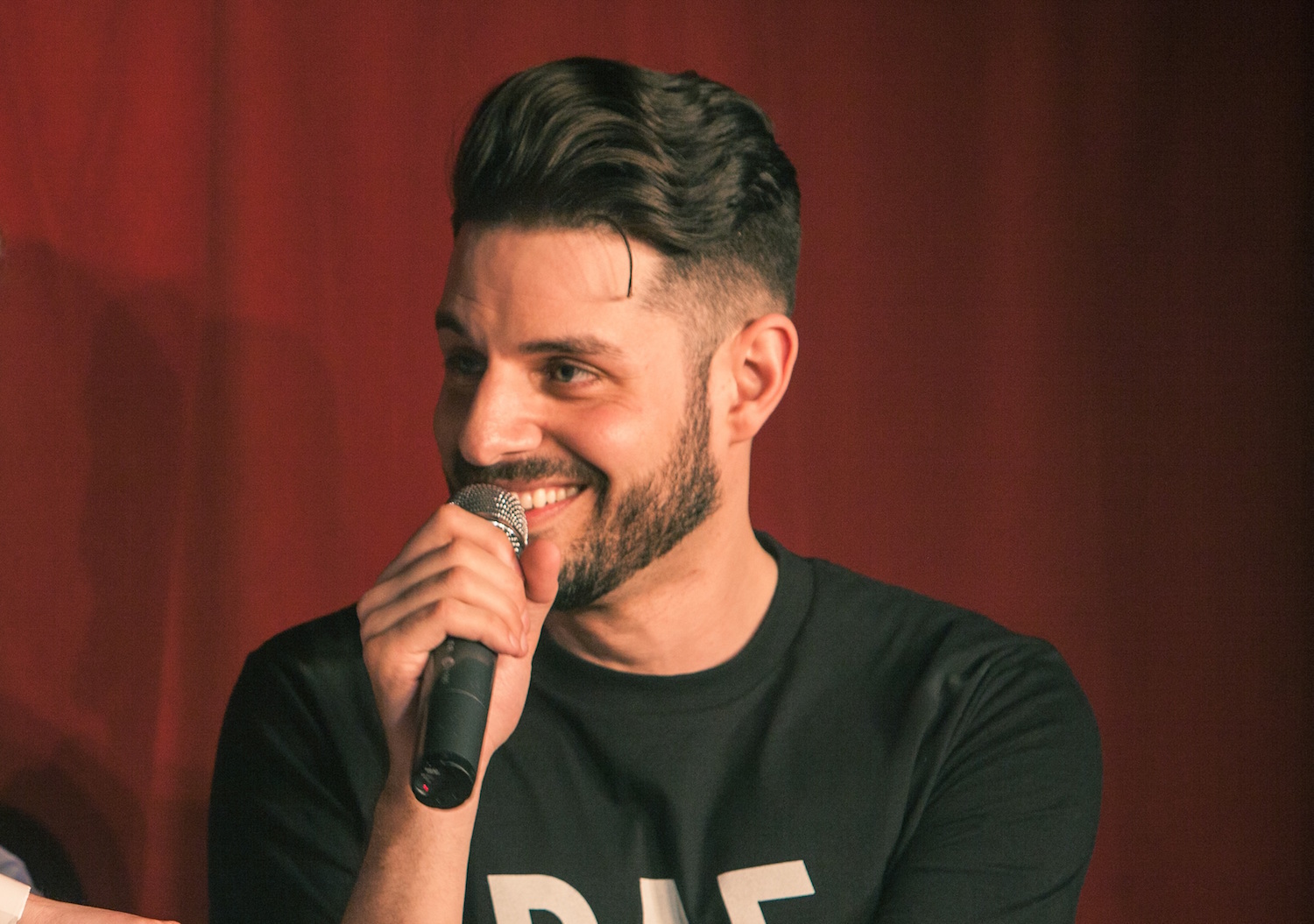Queer narratives often center around one particular catalyst — a snapshot ‘coming-out’ story which propels us from fear to self-acceptance. In reality, the journey towards self-discovery is far more nuanced; few understand this better than Wayne Dhesi, who made it his mission to “fill in the gaps” of the gay experience with his charity, RUComingOut.
The website houses an enormous array of stories good, bad, and ugly which demonstrate that self-acceptance is usually preceded by struggle. Dhesi balances his charity work with his role as Stonewall UK’s Youth Manager — his overall contribution to the queer fight has been pivotal in helping LGBT+ individuals, young and old, embrace their identities and move towards happiness.

Why did you decide to start RUComingOut?
Because I think it’s important to fill in the gaps in the LGBT+ experience. That gap is between the point at which you know you’re not straight and the point at which you’re happy to identify as LGBT+. For me, that was six years — I knew I was probably gay at 15 but didn’t come out and feel comfortable identifying as gay until I was 21. In these six years I didn’t feel I belonged anywhere, but this hidden narrative of the LGBT+ experience was never shown in films and TV shows I was exposed to. It’s important for people to see it.
What were you aiming to achieve with RUComingOut?
The aim of the website was to show visitors that even some of the most confident LGBT+ role models have been through hard times to reach self-acceptance. I just wanted to show examples that might offer advice or inspiration, because TV shows often portray gay characters as either happy and secure or miserable, but they’re really the same person — I was destined to be unhappy and confused for a while because it was part of the process of admitting my LGBT+ identity.
Do you think media portrayals of LGBT+ characters are starting to diversify?
Completely. The key is when you see an LGBT+ person whose LGBT+ identity isn’t the main point of their character. 10 years ago I can imagine teams of writers saying “we need a gay character” — which I’m sure still happens now, and it’s not necessarily a bad thing if we can still get representation in some way — but we now see characters that aren’t primarily defined by their sexual orientation or gender identity.
How do you feel about media reluctance to identify the Orlando massacre as a hate crime?
I think it’s difficult for non-LGBT+ people to discuss Orlando and feel that they’re doing it in the right way and with the right language. It did affect the LGBT+ community hugely because, despite being a faraway attack on people we’d never met, it felt like an attack on all of us. I was shocked at how much it affected me.
The conclusion I’ve drawn personally and by talking to friends is that it felt like an attack on our space. Gay spaces were created out of need to have safe spaces where we can go and feel at ease with who we are. Other bars and restaurants were created out of a need for people to go and eat and drink, which is very different. I tend to take for granted my safety in places like Soho, so for 49 people to have their lives ended so brutally in a place they felt protected, that shattered that sense of safety for all of us.
Do you think it highlighted complacency within the gay community?
I think what it did do was highlight everyday homophobia. It’s dangerous to focus solely on extremes because it suggests that small incidents aren’t important, but for me it’s on a scale of homophobia. It’s obviously at the upper end of that scale, but at the other end is someone being called a ‘queer’ on the street — it’s your identity being used to mark you as a target for verbal or physical attack.
How can young people actively fight discrimination?
Activism is rooted in authentic conversations. I would encourage young LGBT+ people to discuss their experiences with straight friends, because I’ve seen RUComingOut generate conversation amongst friends and family members who didn’t realize these experiences were so difficult.
The biggest thing we can do is actually very small — be unapologetic and don’t self-censor. It reminds people that we’re here, we’ve always been here and we’re not going anywhere. LGBT+ people are integral to the fabric of society; we’re doctors, athletes, shopkeepers, police officers, and street sweepers but it’s often forgotten because a lot of us are more closeted than we think. I’m guilty of it myself. I might not correct a taxi driver asking whether or not I have a girlfriend — mainly because I can’t be bothered to run the risk of homophobia. I should be open and talk about my boyfriend instead, but there’s still a niggling fear that stops me from doing that. What we can do is be as open as possible when these situations arise.
How about on an institutional level?
Ask schools to get involved with the work of charities like Stonewall. Talk to your parents, get them on board, and challenge things like uniform policies and toilet policies at school — there’s a lot that young people can do if they feel energized to do so. Start an LGBT+ allies group. Do some reading as well — learn about the history, the fights, and struggles of those that came before. You have to understand what came before to understand what comes next.
Are there any films or books you would recommend for those seeking authentic portrayals of LGBT+ experiences?
Milk is an amazing film. It shows the raw reality of that time and space — that necessity of rallying the troops and getting everyone behind the cause. Beautiful Thing is maybe my favorite LGBT+ film because it takes the fight for acceptance and brings it to a personal level, and then there’s Freeheld which is unique; the lead characters are both lesbians, but their sexuality is fairly secondary to the story of love lost. In terms of books, Straight Jacket is brutally honest — the writer, Matthew Todd, talks about the ways our experiences spent in our ‘straight jackets’ can go on to affect our experiences in later life.
How close to full acceptance do you think the community has come?
It’s so important to acknowledge that we’ve come a long way, but there’s still a while to go. People look at equal marriage and think it’s a definitive victory, and it’s dangerous to think that — complacency can be dangerous. We shouldn’t let it negate the fact that so many LGBT+ people struggle daily. We should thank those that fought for it, but let’s not celebrate too much — at least not until we have full social equality too. Trans people are still a long way from having a legal framework that means they can be accepted as they are. 40% of people still live in countries where lesbian, gay, and bisexual people can be put in prison for being themselves. We’ve come so far, but the fight isn’t over yet.
Credits
Text Jake Hall
Photography Robert Gershinson
